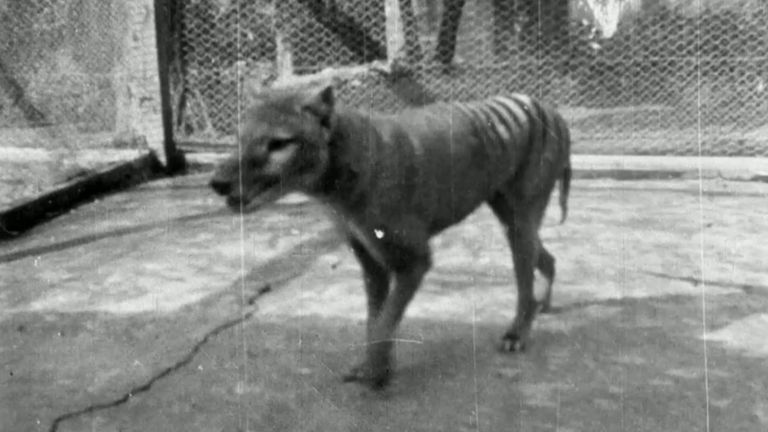The Tasmanian tiger, a wolf-like marsupial that once stalked the forests of Tasmania, could be brought back from extinction after a team of US and Australian researchers claimed a series of scientific breakthroughs.
Also known as the thylacine, the labrador-sized beast was Australia’s only native apex predator.
The last one died in a Hobart zoo in 1936 after the rest had been hunted to extinction in a bid to protect Tasmania’s growing livestock industry.
However, its recent demise makes it an ideal candidate for “de-extinction”, according to Colossal Biosciences, the Dallas-based company behind the effort.
Colossal has previously announced plans to use the latest advances in gene editing and reproductive biology to bring woolly mammoths and even the dodo back from the dead.
“The thylacine samples used for our new reference genome are among the best-preserved ancient specimens my team has worked with,” according to Beth Shapiro, Colossal’s chief science officer.
“It’s rare to have a sample that allows you to push the envelope in ancient DNA methods to such an extent.”
Most attempts to reconstruct the genetic code of long-extinct species are thwarted by the fact that DNA is fragile and breaks down over time.
But a 108-year-old specimen preserved in alcohol at a museum in Melbourne has allowed the team to extract a thylacine DNA sequence they claim is 99.9% the same as the original.
They were even able to extract more fragile RNA molecules from the sample. This allowed the team to see which of the thylacine’s genes were being expressed in certain tissues.
“With this new resource in hand we will be able to determine what a thylacine could taste, what it could smell, what kind of vision it had and even how its brain functioned,” said Professor Andrew Pask from the University of Melbourne, who is collaborating on the project.
Experts tweak genes in closest living relative
But having the thylacine’s genes is only one step towards resurrecting it.
Colossal’s approach uses gene editing techniques to change the genome of the thylacine’s closest living relative – a hamster-sized marsupial called the fat-tailed dunnart – to create a creature as close to the thylacine as possible.
They claim to have made more than 300 thylacine-derived genetic “edits” to dunnart cells grown in the lab, as well as learning how to induce ovulation in the tiny marsupial and grow its embryos outside of its womb – similar to techniques used in human IVF.
The plan is not without its critics, however.
Some conservationists argue the millions of dollars being invested by companies like Colossus would be better spent preserving the habitats of animals currently at risk of extinction – which includes a fifth of Australia’s native mammals.
Others argue it would be unethical to return long-extinct animals to habitats so degraded by human activity they may not support their long-lost inhabitants.
De-extinction is a ‘fairy tale science’
Some scientists believe it’s just too technically difficult.
“De-extinction is a fairy tale science,” Professor Jeremy Austin from the Australian Centre for Ancient DNA told the Sydney Morning Herald in 2022 when the project was announced.
However, others argue de-extinction research can’t hurt – even if it just ends up advancing understanding of long-extinct species and preserving their DNA for future research.
The advances made in marsupial IVF for the thylacine project “can be applied across the marsupial family tree”, argues Prof Pask of the Thylacine Integrated Genomic Restoration Research Laboratory.
It’s suggested they could help ongoing efforts to protect threatened species like the Tasmanian devil that currently faces a similar fate to the Tasmanian tiger.



























